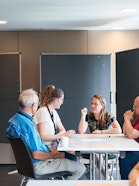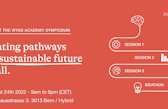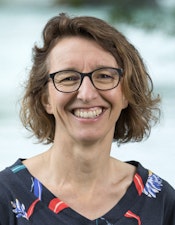The Ideathon
Project Update
Publish date: October 2, 2022

Our harvest - from The Ideathon
The first Wyss Academy Symposium provided us with many insights that will be valuable to the work of our organization. Here is an overview of the findings obtained during our discussions during the Ideathon – and what we learned to help us improve the way we conduct future events of this kind.
The Ideathon (afternoon)
Smaller groups came together in the afternoon to generate ideas that could help us tackle distinct challenges identified in the Wyss Academy’s Regional Hubs. This ideation exercise aimed to build a “knowledge bank” for our Hubs, but also to inspire out-of-the-box innovations and point to new collaboration. These were some of the results.
Challenge 1: Food systems
Many food products are the result of complex and opaque international value chains that often involve unsustainable farming practices, bad working conditions and nutritionally detrimental processing methods.
A pathway toward sustainable food production would be to re-establish a connection between food producers, consumers and nature. How could this be accomplished?
Ideas:
Directly engage with youth, both as future consumers and as farmers, by including hands-on farming experiences at schools. Youth could also be addressed through the Changemakers Program currently in development at the Wyss Academy.
Create financial incentives for sustainable and healthy food.
Challenge 2: Semi-arid landscapes
Wildlife and pastoralist communities need to move across the landscape of Northern Kenya in order to secure pasture, water and food. This is essential to their survival. However, their movement and the vital connections between ecosystems are increasingly threatened by competing claims on land.
Here and in similar semi-arid landscapes, what sustainable approaches could benefit both wildlife and the human population?
Ideas:
Productive Circular Islands is a concept that involves the circular use of water and energy (such as biogas from manure) and the Terra Preta soil management strategy, which can improve soil fertility with sustainable charcoal. The Wyss Academy is evaluating this approach for use in its Solutionscapes.
Innovative approaches to the use of solar energy will also be evaluated by the Wyss Academy.
Challenge 3: Preventing deforestation
Deforestation will not stop until we find ways to transform the economic value that humanity assigns to the standing forest. To this value, we must add all the environmental, social and economic services that a forest provides.
In the case of the Amazon rainforest, this includes climate and water regulation, the sequestering and storing of carbon, and its value for local communities.
How can we enhance the value attributed to the standing forest, in order to maintain it and ensure that communities living in and from these forests have sufficient income opportunities?
Ideas:
A value chain approach could be applied to various sectors that are sources of deforestation, in order to identify opportunities for improvement.
The Wyss Academy aims to comprehensively map the various regulations, actors and platforms involved in gold mining in the Madre de Dios region of Peru, from South America to Switzerland.A Citizen Science approach could ensure greater participation in the generation of knowledge and decision-making within a landscape.
The Wyss Academy will test this approach within its relevant Solutionscapes.

Team
- Project contactProject contact
Tatjana von Steiger
Global Policy Outreach Lead
